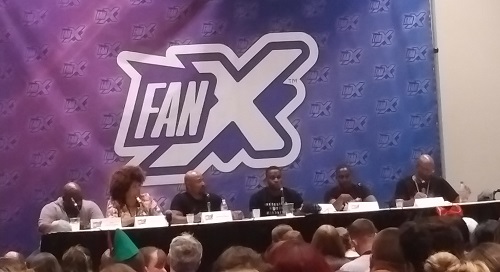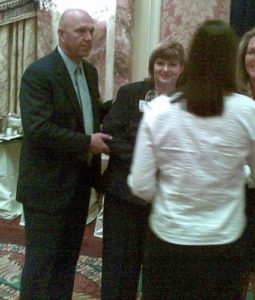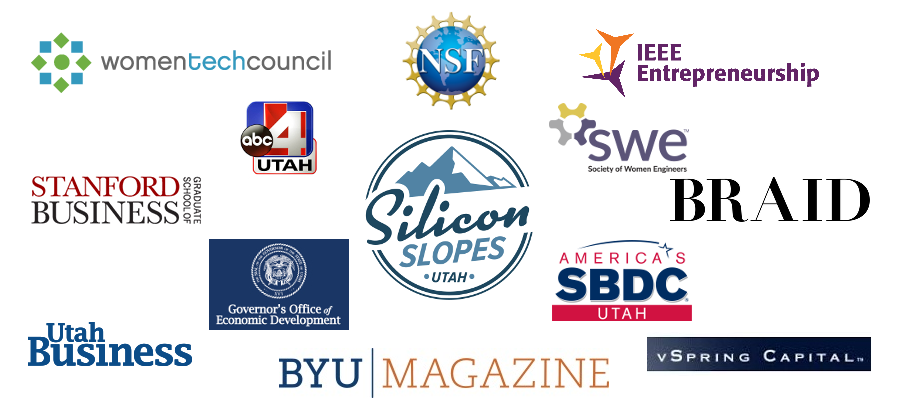I’ll be candid, I have sat through an infinite number of panels, and few of them are really useful. Creating a really useful, compelling panel would be amazing and these would be some ways to do so. Most moderators do NOT do any of this – hence the reason panels are usually useless.
 Obviously you are reaching out to conferences, getting your PR in front of them, issuing cool announcement around events etc, and so eventually you may get tapped as a moderator for a panel as one of our coaching clients did. It was a huge opportunity as her company was in the early, early startup phase. Here are some things I suggested to her, and to you, to prepare for a great panel
Obviously you are reaching out to conferences, getting your PR in front of them, issuing cool announcement around events etc, and so eventually you may get tapped as a moderator for a panel as one of our coaching clients did. It was a huge opportunity as her company was in the early, early startup phase. Here are some things I suggested to her, and to you, to prepare for a great panel
1) A very crisp “elevator/email” pitch for your business as this a HUGE Marketing opportunity for you – the (not so secret) reason to do it! Whether you share it or it’s read by the conference team when they introduce you, this is your chance to highlight your business! (I will note that we coach a lot of clients on this issue of the pitch – most entrepreneurs find this difficult, including me! So we’ve created a process/formula on this to help, so don’t feel bad if you don’t have this right now, just make sure you have it before the panel!)
1a) Of course as soon as you are confirmed, you’re all over social media and email marketing to all your potential clients about it. Something like this: “So honored to be moderating the “really cool topic” panel for the ABC conference. Join me there on [date here]. Here’s the link to register to attend with earlybird pricing!” You look like good citizen for the conference or summit, AND you show yourself as the industry leader that you are!
2) Get a clear understanding of the objectives of the conference/summit organizers for this panel. Why did they pick this particular topic and what do they want attendees to get out of it? Is it the “same old topic” as previous events or is it new and fresh (either way you will help make it new and fresh…)
3) Gather as much background information as possible on each panelist, their business (see above – get their elevator pitch!), a 1-2 sentence biography, and their “point of view” on the panel topic. A phone call or at least a detailed email exchange is essential here. The reason so many panels are lame is that the moderator has no idea of the point of view of the panelists and so cannot ask very interesting questions, encourage powerful stories or draw out contrasting points of view. And ask each panelist what they would like to accomplish on the panel as well (highlight a new product, introduce their new company, emphasize their market leadership). Let them know you are on their side and that you’re job is to make a compelling panel that reflects well on the participants. But also remind them that brevity is the soul of wit, never more so than on a panel! Be crisp, be clear, be brief.
4) Ask each panelist to be prepared to share at least 2 actionable recommendations or original insights and to share them with you in advance (so you can make sure you ask questions that elicit these nuggets!). Panels fail because the attendees don’t get anything to take away. By asking panelists to send their recommendations/insights to you in advance you force them to THINK about the topic and how it could/should affect the industry and attendees. And, if they all have the same “original insight” you need to let them know (and I suggest that you tell them that they all said the same thing, so you’ll share that (not very original) insight with the audience and ask for some other good stuff from them!)
 5) Encourage panelists to use stories to share their insights. Appropriate humor is good, and real world wins, saves or near disasters are always memorable. Moments of disruptive insight (“how did you decide the world needed your widget?”), customer success stories, or the reason for pivots or shifts can be compelling. And….remember, original insights or actionable recommendations will make your panel stand out. Make sure you have a good idea who has what compelling story, and then direct question to that panelist, such as: “Mary, your newly launched service saved one of your customers from a ‘Singles Day’ server disaster, can you tell us what happened?”
5) Encourage panelists to use stories to share their insights. Appropriate humor is good, and real world wins, saves or near disasters are always memorable. Moments of disruptive insight (“how did you decide the world needed your widget?”), customer success stories, or the reason for pivots or shifts can be compelling. And….remember, original insights or actionable recommendations will make your panel stand out. Make sure you have a good idea who has what compelling story, and then direct question to that panelist, such as: “Mary, your newly launched service saved one of your customers from a ‘Singles Day’ server disaster, can you tell us what happened?”
6) Learn as much as you can about the anticipated audience – career level, industry, focus etc. Then think about what they may need and want. Is this a hot new area, like artificial intelligence, for a C-level audience who needs the basics so they don’t fall behind? Hands on nitty-gritty for a highly technical crowd? As always in business, understanding the “customer” is essential.
6) Develop very crisp and useful general questions that you test drive with people in the industry beforehand. Even if it’s with your staff – have them pretend to be panelists and see what comes out – it is useful? insightful? relevant? If not, come up with better questions!
6a) Remember, you can direct certain questions to certain panelists and DON’T ask the same question of each panelist – ho-hum! How many questions should you have? One rule of thumb is the length of the panel divided by number of panelists = number of questions to have prepared. Example 30 minutes / 3 panelists = 10 questions.
7) Create an outline for yourself. Start with housekeeping such as panel topic (why do you think airlines always introduce the flight number and destination!), brief bios and pitch of each panelist (make them sound great!) and then alternate more general questions with stories and insights you know are out there in the panel. Make sure each panelist has a chance to shine, but make sure all answers are crisp and short. If someone drags on, it’s up to you to redirect!
8) Make sure you have some “audience questions” pre-staged – I like to have people WRITE DOWN their questions or submit them in advance if the conference has a mechanism for that. There are many people who have good questions but won’t stand in front of a microphone. As you mingle with the conference attendees before your panel, let them know you are moderating the “really cool topic” panel and ask them if they have any questions – write them down and have them with you! Start with “as we wait for folks to get to the microphone, one conference attendee suggested this question for our panel…..”
9) That’s a wrap – have your conclusion/summation already drafted before the panel and update as needed. Thank the panelists, the audience and thank the conference organizers for their great work. Sail off into the success sunset!
And as for our coaching client? She thanked me for our help. Then she sent two images. One showing a huge jump in her LinkedIn profile views after the panel. The second was a press article “Top 10 takeaways” from the summit. The picture that went with that article on the thought leaders – her panel and she was front and center!
If you are planning to raise funding for your startup,
Click to Get our FREE VentureWrench Guide to Investor Capital
50 pages of insider insights to help you succeed!

